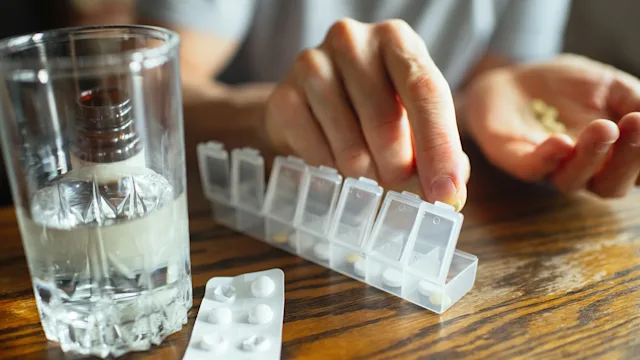Key takeaways:
A high creatinine level in a blood test can be a sign of decreased kidney function or kidney disease. But there are other causes of high creatinine.
Some medications can increase the creatinine level without actually hurting the kidneys. This includes some antibiotics, antacids, and cholesterol medications.
If you take one of these medications and your creatinine level is above normal range, it’s still important to follow up with a healthcare professional to make sure your kidneys are healthy.
After a blood test, it’s easy to worry if any of the results are out of normal range. And one of the most common abnormal lab results is a high creatinine level.
Creatinine is a substance in the blood that’s removed by the kidneys. So it can be an indirect measure of kidney function. A high result on a creatinine blood test could mean your kidneys aren’t functioning at their best. But this isn’t always the case.
What can cause high creatinine levels?
Many conditions and medications can cause problems for the kidneys and lead to high creatinine levels. Some examples include:
Diabetes
High blood pressure
Autoimmune conditions, like lupus
Polycystic kidney disease
Renal artery stenosis
Medications, like nonsteroidal anti-inflammatory drugs (NSAIDs) and diuretics
Search and compare options
But there are other causes of high creatinine levels that don’t suggest long-term kidney disease. These include:
Dehydration, which can temporarily increase creatinine levels
High protein intake
A large amount of muscle mass
Recent intense exercise
Creatine, a common supplement for bodybuilders and other athletes
And there are a few medications that elevate creatinine levels without actually affecting kidney function.
Common medications that cause high creatinine levels without hurting the kidneys
1. Sulfamethoxazole / trimethoprim (Bactrim / Septra)
Sulfamethoxazole / trimethoprim (Bactrim) is an antibiotic that people take for urinary tract infections (UTIs), skin infections, and some upper respiratory infections. It causes the body to retain more creatinine than you normally would. And this may elevate your creatinine blood test even though your kidneys are working perfectly fine.
In one study of people who had a kidney transplant, taking trimethoprim caused false increases in the creatinine level even though the kidneys were working normally.
2. Cimetidine (Tagamet)
Cimetidine (Tagamet) is an acid blocker that people take for acid reflux and heartburn symptoms. It decreases the amount of creatinine the body clears but doesn’t harm the kidneys. Cimetidine is a common cause of a falsely elevated creatinine test, according to a 2012 review of related research.
Understanding your creatinine blood test: We walk you through the common causes of high and low creatinine, and what to do next.
Drink to your kidney health: Read through our list of beverages that research shows can help protect your kidneys.
Medications that cause kidney damage: Some medications that cause high creatinine can actually damage your kidneys. Here are the most common culprits.
Cimetidine can increase the level of creatinine by about 15% in people who have normal kidney function. Creatinine levels will usually return to normal when someone stops taking it.
Famotidine — a related heartburn medication — doesn’t cause the same false elevations of creatinine.
3. IV cephalosporin antibiotics
Cephalosporin antibiotics treat skin infections, ear infections, UTIs, and respiratory tract infections. Some of them can interfere with the creatinine blood test.
Read more like this
Explore these related articles, suggested for readers like you.
Studies show that IV (intravenous) cefoxitin and cefazolin can falsely elevate creatinine levels. But none of the commonly prescribed oral cephalosporins would falsely elevate creatinine. These include cephalexin (Keflex), cefuroxime (Ceftin), and cefaclor (Ceclor).
4. Fenofibrate (Tricor)
Fenofibrate (Tricor) lowers triglyceride levels and improves cholesterol. People take this when they have very high triglyceride levels or a high risk for heart disease. It causes the body to make more creatinine than normal. This can result in a creatinine level above normal range, but this has nothing to do with kidney function.
Less common medications that can elevate serum creatinine
There are many other medications that have been reported to cause high serum creatinine without any true harm to the kidneys. These include:
Pyrimethamine (a medication to treat parasites)
Aloxiprin (a salicylate medication used in some types of arthritis)
Phenacemide (an antiseizure medication)
High doses of prednisone (a steroid used in many different conditions)
If you’re taking a new medication and notice a change in your creatinine level, it makes sense to look into whether the medication might be the cause.
What is a normal creatinine level?
A normal creatinine range varies slightly between men and women. This is because of the variation in average muscle mass.
Normal creatinine for a man | 0.6 mg/dL to 1.2 mg/dL |
Normal creatinine for a woman | 0.5 mg/dL to 1.1 mg/dL |
What are the symptoms of high creatinine?
Most of the time, a high creatinine will not cause any symptoms. If a medication is causing a high creatinine, without actually affecting the kidneys, you will not have any symptoms. But this is also true even if you have a high creatinine from a decline in kidney function.
If a high creatinine is caused by true kidney disease, you may notice:
Decreased urination
Frothy or bloody urine
Leg swelling or fluid retention
Fatigue
Loss of appetite
Shortness of breath
Itchy skin
When to worry about creatinine levels
Anytime you have a high creatinine level, it should be taken seriously. This doesn’t necessarily mean you have a long-term kidney disease or that you have any permanent kidney damage. But still, it’s more likely that a high creatinine level is due to a change in kidney function rather than a false alarm — even if that change is only temporary.
So if you have a high creatinine level, it’s important to talk with your healthcare team. They can help figure out if it’s a sign of kidney disease. They can also provide guidance on what you can do to lower your creatinine levels. And it may be as simple as staying hydrated or stopping a certain medication. So don’t worry — just be sure to get it checked out.
Frequently asked questions
The BUN/creatinine ratio is another test for kidney function. BUN stands for blood urea nitrogen. It’s a test that measures the amount of urea nitrogen in the blood. Urea nitrogen is a waste product that the kidneys filter out of the blood. As a stand-alone test, BUN isn’t very helpful for estimating kidney function. But comparing it to the creatinine level provides more information. For example, a high BUN/creatinine ratio can suggest that someone is dehydrated.
There are many reasons your doctor might order a creatinine test. For most people, it’s simply part of routine blood tests that provide an overall picture of health. Your primary care provider may also order a creatinine test if you take medication or have a health condition that could affect your kidney function. The creatinine test is an easy way to monitor and track your kidney health. Finally, your primary care provider may also order a creatinine test if you have new symptoms that could be related to kidney problems.
A low creatinine level isn’t necessarily a cause for concern. For example, pregnancy naturally causes lower creatinine levels. Other causes include low muscle mass, or a low-protein diet. So you don’t need to worry, but it’s still important to talk with your healthcare team about why you may have a low creatinine level.
The best way to help lower your creatinine levels depends on what is causing them to be elevated in the first place. So it’s important to work with your healthcare team. But in general, you can lower creatinine levels by:
Staying well hydrated
Keeping your blood pressure within normal range
Avoiding medications that may harm the kidneys, like NSAIDs
Keeping your blood sugar within normal range if you have diabetes or prediabetes
The BUN/creatinine ratio is another test for kidney function. BUN stands for blood urea nitrogen. It’s a test that measures the amount of urea nitrogen in the blood. Urea nitrogen is a waste product that the kidneys filter out of the blood. As a stand-alone test, BUN isn’t very helpful for estimating kidney function. But comparing it to the creatinine level provides more information. For example, a high BUN/creatinine ratio can suggest that someone is dehydrated.
There are many reasons your doctor might order a creatinine test. For most people, it’s simply part of routine blood tests that provide an overall picture of health. Your primary care provider may also order a creatinine test if you take medication or have a health condition that could affect your kidney function. The creatinine test is an easy way to monitor and track your kidney health. Finally, your primary care provider may also order a creatinine test if you have new symptoms that could be related to kidney problems.
A low creatinine level isn’t necessarily a cause for concern. For example, pregnancy naturally causes lower creatinine levels. Other causes include low muscle mass, or a low-protein diet. So you don’t need to worry, but it’s still important to talk with your healthcare team about why you may have a low creatinine level.
The best way to help lower your creatinine levels depends on what is causing them to be elevated in the first place. So it’s important to work with your healthcare team. But in general, you can lower creatinine levels by:
Staying well hydrated
Keeping your blood pressure within normal range
Avoiding medications that may harm the kidneys, like NSAIDs
Keeping your blood sugar within normal range if you have diabetes or prediabetes
The bottom line
If your blood test shows a high creatinine level, there are many possible explanations for this. And one of them could be your medications. Some medications can potentially harm your kidney function. But other medications can simply change the results of the blood test. Talk with a healthcare professional about additional testing to see whether your kidneys are functioning normally.

Why trust our experts?


References
Andreev, E., et al. (2001). A rise in plasma creatinine that is not a sign of renal failure: Which drugs can be responsible? Journal of International Medicine.
Berg, K. J., et al. (1989). Renal effects of trimethoprim in ciclosporin- and azathioprine-treated kidney-allografted patients. Nephron.
Burry, H. C., et al. (1976). Apparent reduction of endogenous creatinine clearance by salicylate treatment. The BMJ.
Dubb, J. W., et al. (1978). Effect of cimetidine on renal function in normal man. Clinical Pharmacology and Therapeutics.
Hosten, A, O. (1990). Chapter 193: BUN and creatinine. Clinical Methods: The History, Physical, and Laboratory Examinations. Butterworth.
Nanji, A. A., et al. (1987). Interference by cephalosporins with creatinine measurement by desk-top analyzers. European Journal of Clinical Pharmacology.
Samra, M., et al. (2012). False estimates of elevated creatinine. The Permanente Journal.
Van Acker, B. A., et al. (1993). Effect of prednisone on renal function in man. Nephron.
Wiles, K., et al. (2018). Serum creatine: A systematic review. Kidney International Reports.


















